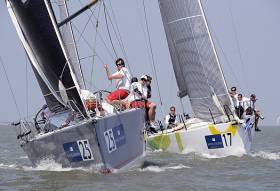Displaying items by tag: Dobbs Davis
RORC Defends IRC Handicap Following Irish ORC Presentation
The Royal Ocean Racing Club (RORC) in London says a 'correction is needed' over information contained in an article following an ORC presentation at the ICRA Conference in Limerick, a week ago. Michael Boyd, the Commodore of RORC, says the offshore body 'read with interest', and 'some confusion', the press release by the ORC. Boyd says he feels 'very strongly' that information put forward by Dobbs Davis, Chairman of ORC’s Promotion and Development Committee, 'needs correcting'.
In a statement issued by RORC, who administer the rival IRC system, the club says:
First, the numbers presented are wrong. Dobbs quotes the number of ORC certificates in total up until the end of the year, but only quotes the number of boats in IRC until the end of August of 2015. These are very different figures. Dobbs quotes 4958 for IRC in 2015 but the real number of certificates for the whole year is 7721. That makes the graph look very different and makes IRC the largest individual system in 2015 with ORC Club behind it at 7404 and ORCi trailing at 2492.
It should also be noted that both IRC and ORC are International Rating Systems recognised by World Sailing and IRC is currently in discussions with World Sailing about having its own World Championship. Rather than having two world championships for offshore boats, we are supporting the WS initiative to have one jointly scored IRC/ORC world championship which will allow the event to travel to other continents.
IRC is expanding with new territories in India and Taiwan, growth in Japan and China and very encouraging numbers for the start of the year from many Northern European countries.
IRC is also flexible and not limited to using time-on-time scoring - as has also been suggested. A simple time-on-distance calculation can be applied to create a time-on-distance value, should race organisers want to use it. Similarly, crew number or crew weight can be applied depending on the race organiser’s needs and wishes.
IRC is doing a great job for our sport – you only have to look at the style of boats that have developed since the demise of IMS (the basis of ORC) to understand that IRC is a progressive rule – with the latest generation of boats being fast, safe and fun to sail. Our goal is to ensure that we provide a first class service and develop a product that is constantly evolving to make sure that racing under IRC is as fair as is possible.
- Michael Boyd, Commodore, ROYAL OCEAN RACING CLUB






























































